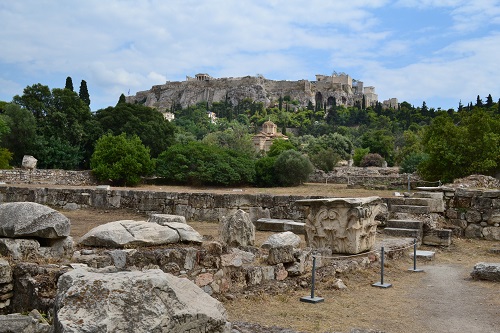The role of the intellectual:
Knowledge and responsibility in public life
February 14, 2019
Nearly two and a half millennia ago, a Greek aristocrat founded the first Academy. He also wrote a book about the role of the intellectuals in public matters – and how a good leader should have a philosophical background, that is an understanding of what it is to be just, truthful and good.
To read more, please check this article.
Can you suggest ONE THING that each of us – students, lecturers, writers – could do, to help turn this difficult situation around, and contribute to saving Europe and its values from destruction? What would Plato’s philosopher-king do, in these circumstances?


Discussing the role of the intellectual is never an easy matter, as the only possible outcomes seem to be pretentious vainglory or borderline psychotic apathy. To me, the answer to this question lies within the philosophy of another greek, Seneca. As pointed out by Nicholas Taleb in his book "The Bed of Procrustes": "For Seneca, the Stoic sage should withdraw from public efforts when unheeded, and the state is corrupt beyond repair. It is wiser to wait for self-destruction.". The intellectual should use his voice and wisdom and try to inform the general public about the destruction he foresees, but if ignored, he should retreat and let the crisis take its transformative course. Modern intellectual manifests often feel vapid and trivial, and more of an "I told you so" than an actual expression of concern. The role of the intellectual should be to advise the society, but if ignored, he should respect democracy and withdraw, and during this self-imposed exile, he should idealize methods of reconstruction and not pen conceited open letters, as we often see.
I personally believe that an effective way of understanding the problem at hand is to promote education on the problem. Populism and Xenophobia have begun their reign over the world, and I believe enabling children in understanding these issues is very crucial. In all honesty I believe this problem can only be eradicated by appropriate education provided to all individuals
Zaair, that is a good point. Education may not answer to all our problems, but it certainly helps tackling populism, xenophobia and the like. But do you think promoting education on these social dangers is straightforward? What if intellectuals (or teachers) themselves have such tendencies? And how do we make sure we draw the lines correctly between populism, good nationalism and bad nationalism, for instance? Who should be in charge of drawing these lines? Is it the government? What if extremist views are present (or even dominant) inside the government?
It’s never easy to address these things in abstract. Some examples of concrete situations (in different countries / cultures) would help.
As the world in the present has a serious issue towards human rights, including a freedom to speech or speak about a topic relating with ethical problems, a tendency of ‘off-words’ which I created the words as a definition of ignoring what a person speaks against to something and continue to being an onlooker. Nowadays, to argue something could be seen as something inappropriate because it might violate human rights, for instance, if somebody says he is from Asia, it could be taken as racism because saying Asian could be meant as not respecting his nation and ignore his background. As I say, this type of tendency is a part of tendency in this world, so not the national consciousness.
The relationship between my argument and the issue of the role of the intellectual is that, both populism and xenophobia are coming from the confusion of classifying what a nation is. A nation is usually defined as a group of people in a country, but recently it is changing. A nation could be the people from different diversity, country, background and being able to create a country together. People in this world may not understand what’s going on now and politicians are not helpful to classify what the truth is and how to conduct it to people.
One of the best actions we all can do is to start educating the young earlier. By explaining the situation to the young and giving them a basic understanding of what is going on we can start to address the problem. When we leave the young in the dark and let other influences establish their thoughts and beliefs, it allows for views such as populism and xenophobia to take root. Plato was a big proponent of discussing philosophical ideas with whoever would listen and I think he would have liked to have a room full of students listening to his ideas.
In an effort to combat the destruction of morality and values of Europe, Students, teachers, lecturers and writers, must educate themselves on the problem at hand. One instance in which educators could inform their students on such issues would be by requiring them to research and debate on these issues. Much like a "current events" assignment which will open the discussion and inform more people on such subjects. Lecturers and writers should do the obvious, write and bring voice to such subjects. However, they should attempt to go a step further and practice what they preach. Creating surveys, gathering more information and actually partaking in the debates physically. As well as creating valid plans of action.